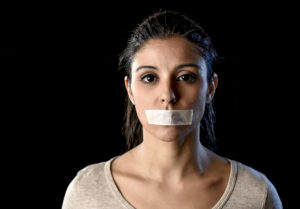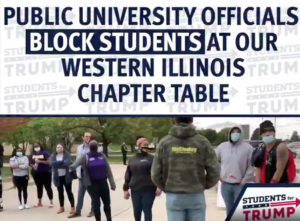2020 Year in Review: Free Speech Truths and Trends in Higher Education
But we were watching – and fighting back – against schools that flagrantly disregarded the rights enshrined in our country’s First Amendment.
Here are some free speech truths and trends that we’ve observed over the last year:
1. Students are self-censoring political beliefs in the classroom – particularly Republican students.
 College students are silencing their own speech at alarming rates for fear of being “reported” by their fellow students and disciplined through official university policies such as bias response teams. Republican students are particularly vulnerable: a poll conducted by College Pulse on behalf of the College Fix found that in a survey of 1,000 Republican and Republican-leaning college students, nearly three-quarters of them have withheld their political views in class for fear their grades would suffer.
College students are silencing their own speech at alarming rates for fear of being “reported” by their fellow students and disciplined through official university policies such as bias response teams. Republican students are particularly vulnerable: a poll conducted by College Pulse on behalf of the College Fix found that in a survey of 1,000 Republican and Republican-leaning college students, nearly three-quarters of them have withheld their political views in class for fear their grades would suffer.
2. Cancel Culture” has permeated higher education.
Many schools began conducting purity tests for their prospective students, even going so far as to revoke admissions offers for incoming freshmen because of social media posts made years before! These purity tests evaluate students based on a progressive ideology and shame them when they have differing viewpoints. That’s viewpoint discrimination – and it’s a bad look for an industry that claims to value academic discourse.
3. Trump supporters weren’t treated equally on campus.
As campaign season came to a peak, many universities tried to limit and restrict Trump supporters from organizing. At Western Illinois University, for example, a Students for Trump group was harassed by school staff when they set up a table to register voters on campus- and were eventually forced to shut down their display and leave. Speech First proudly came to their defense, sending a letter to the school reminding them of their obligations under the Constitution and letting them know that their blatant interference with the democratic process would not go unpunished.
4. Sidewalk chalk has become controversial.
 Many student groups choose to use sidewalk chalk to inform, recruit, and persuade students about their point of view. University bureaucrats saw the chalk messages as potentially offensive to some students and began enacting additional regulations, stipulations, and sometimes even banning the use of chalk all together. Chalking on a public campus that receives federal funding, however, is a protected form of free speech. Schools don’t have the authority to dictate how students express themselves in a public space.
Many student groups choose to use sidewalk chalk to inform, recruit, and persuade students about their point of view. University bureaucrats saw the chalk messages as potentially offensive to some students and began enacting additional regulations, stipulations, and sometimes even banning the use of chalk all together. Chalking on a public campus that receives federal funding, however, is a protected form of free speech. Schools don’t have the authority to dictate how students express themselves in a public space.
In January of this year, Speech First sued Iowa State in 2020 over their sidewalk chalk ban (as well as several other policies). By March, the school settled the lawsuit and agreed to abandon their unconstitutional chalking policy.
5. Schools are using vague terms in their speech codes to invoke censorship authority.
Schools are changing their speech codes to use legally ambiguous words such as “offensive,” “biased,” “uncivil,” and “rude.” Without defining these broad terms, schools give themselves broad discretion to determine which speech – and whose speech! – violates their policies. Speech First challenged the University of Texas on this very issue, calling into question the highly subjective language used in their verbal harassment policy. In October of 2020, the Fifth Circuit Court agreed with Speech First that we can challenge UT’s unconstitutional policy. In the 3-0 court decision, Judge Edith Jones wrote that in the current condition of higher education, “institutional leaders, in a spirit of panicked damage control, are delivering hasty and disproportionate punishment instead of considered reforms.”
6. New Title IX regulations were issued by the Department of Education to defend free speech. In May of 2020, new Title IX rules were issued by the Department of Education which could provide much-needed clarity for students, universities, families, and administrators on the definitions of discrimination and harassment. Speech First joined forces with other liberty-minded groups in June of 2020 to file a petition in the U.S. District Court in Washington, D.C. asking to participate in litigation of the new regulations. One month later, we were granted permissive intervention, which means we’ll be able to defend the new Title IX regulations that codify important free speech and due process protections at our nation’s colleges and universities, arguing that the Department of Education’s definition of peer-on-peer sexual harassment and the procedural protections it specifies are in many cases not merely good policy choices but actually required by the Constitution.
In May of 2020, new Title IX rules were issued by the Department of Education which could provide much-needed clarity for students, universities, families, and administrators on the definitions of discrimination and harassment. Speech First joined forces with other liberty-minded groups in June of 2020 to file a petition in the U.S. District Court in Washington, D.C. asking to participate in litigation of the new regulations. One month later, we were granted permissive intervention, which means we’ll be able to defend the new Title IX regulations that codify important free speech and due process protections at our nation’s colleges and universities, arguing that the Department of Education’s definition of peer-on-peer sexual harassment and the procedural protections it specifies are in many cases not merely good policy choices but actually required by the Constitution.
7. States still need to be reminded that America is a free speech zone.
 Back in March of 2020, the Georgia Senate passed legislation that would expand free-speech protections for religious and ideological groups and prohibit Georgia colleges and universities from denying meeting spaces and funding for “religious, political or ideological student organizations.” Speech First sent a letter to Georgia Gov. Brian Kemp, urging him to consider this important issue; unfortunately, the Georgia House failed to pass the bill. In happier news, however, the Ohio legislature passed a similar bill in early December, which Gov. Mike DeWine is likely to sign.
Back in March of 2020, the Georgia Senate passed legislation that would expand free-speech protections for religious and ideological groups and prohibit Georgia colleges and universities from denying meeting spaces and funding for “religious, political or ideological student organizations.” Speech First sent a letter to Georgia Gov. Brian Kemp, urging him to consider this important issue; unfortunately, the Georgia House failed to pass the bill. In happier news, however, the Ohio legislature passed a similar bill in early December, which Gov. Mike DeWine is likely to sign.
As we look to 2021, colleges and universities will no doubt have to adapt for a post-pandemic world. But fortunately, Speech First will continue to hold schools accountable, filing lawsuits to ensure that those changes don’t involve limitations to students’ free speech rights.
###
